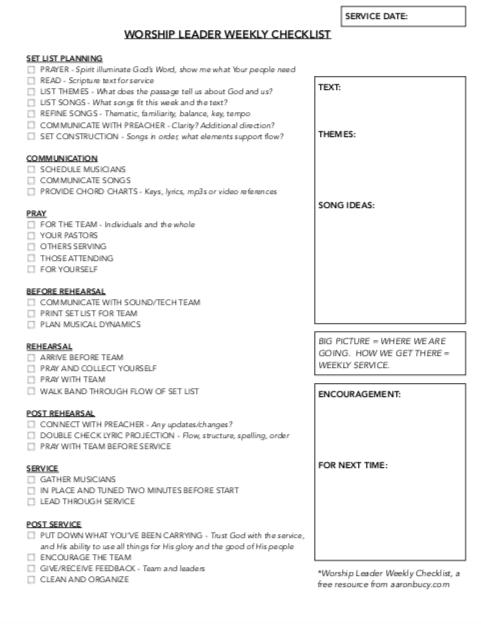In 2012 I attended the first LIFT conference and heard Matt Redman say something which shaped the way I saw leading worship. He said there was a difference between a song leader and a worship leader. This line was so significant, I remember almost nothing of that conference apart from this insight.
As I have continued to reflect on this idea, here are a few things I think define the difference between a song leader and a worship leader…
Song leaders lead songs, Worship leaders lead people. Any competent musician can pick up an instrument and lead a congregation in singing - even non-believers would be capable of that. Worship leaders lead themselves, the team, and the congregation - and one of the ways they do that is through song. Bob Kauflin says - if your instrument and platform were taken away, would your church still recognize you as a leader?
Song leaders use relationships, worship leaders are in relationships. For song leaders, people are either an obstacle or a means. They use people and their skills in service of a song leader’s goals. Worship leaders shepherd, come alongside, engage the ready, and pursue the disengaged. Worship leaders have spaces and relationships where they are known apart from what they do, are accountable and vulnerable.
Song leaders focus on external, worship leaders focus on internal. A song leader is primarily focused on the things that people see - the song choice, setlist, sound, and quality of the band. A worship leader focuses on cultivating those things which are less visible: character, leadership, personal holiness, union with God, a heart for the team and congregation, prayer, and devotion in the secret place.
Song leaders disconnect Sunday from all of life, worship leaders see Sunday as a continuation of a life of worship. Song leaders view Sunday morning as the endpoint of their preparation. Worship leaders view Sunday morning as the culmination of a life of worship, the chance to re-center, remind, encourage, and equip the people of God to be sent out on mission as worshipers once again.
Song leaders help people to sing, worship leaders, help people to live lives of worship regardless of the setting. The world and the Church are filled with gifted musicians, but is often lacking for those servant leaders who help us orient our lives toward the only One worthy of our worship.
Although I have spent time contrasting some of the differences between song leaders and worship leaders, these roles are not black and white. They exist on a continuum. Our natural skills, talents, discipleship, personality, and maturity all influence who we are, and who we are becoming in this process. Every one of us attempting to grow and develop as worship leaders are a mix of song leaders and worship leaders.
It has taken me many years of leading worship to realize that formation toward becoming a worship leader happens from the inside out more than the outside in. The more time I spend focusing on the externals - the obvious skills of being a song leader - the more malformed I become, the more malformed my team becomes. But when I invest from the inside out, I grow a team of worship leaders with song leader skills.
